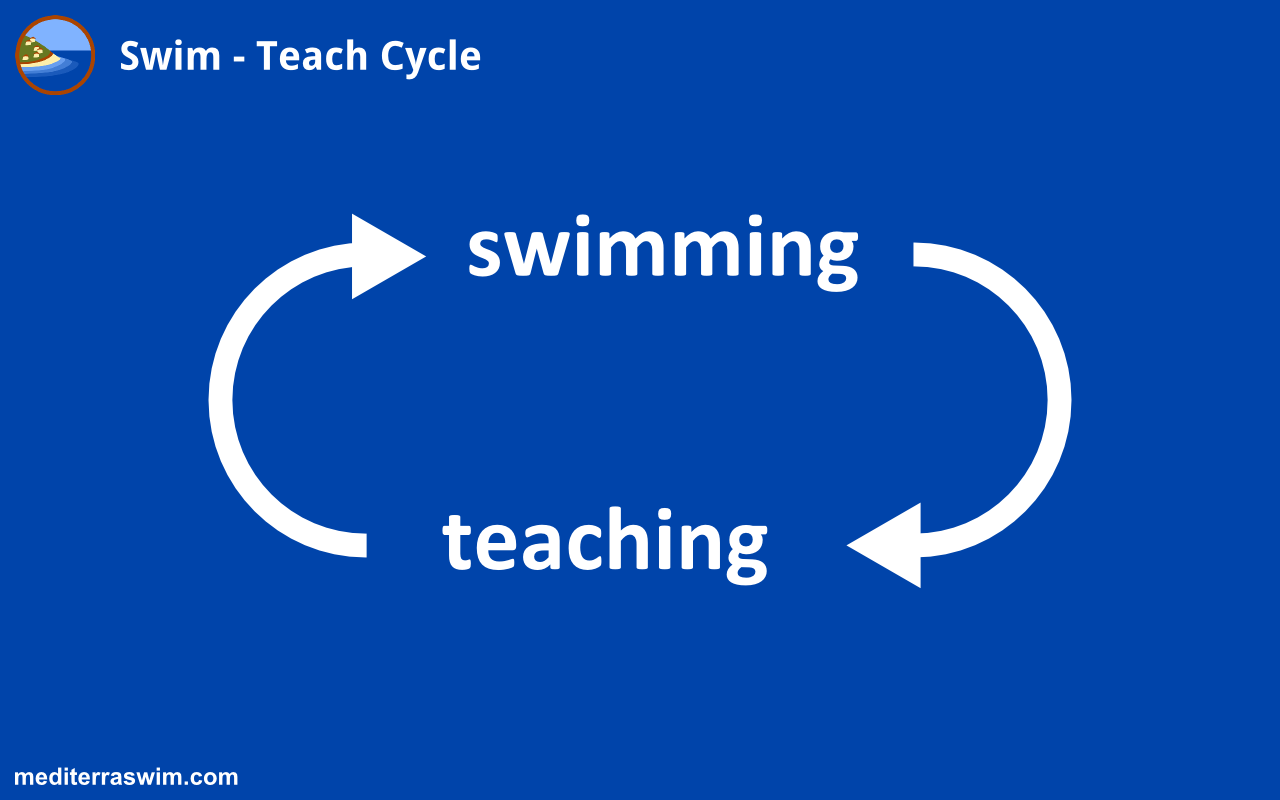What will make you learn this swimming thing much faster, much deeper?
Teach it.
Teach someone else what you are trying to learn right now. This is a powerful Self-Coaching secret.
I can confess openly that my swimming feeds my teaching and my teaching feeds my swimming. It is a powerful combination. I am not sure which is motivating which any more. You think I am helping you (I hope), but you may not realize how much you are helping me by letting me teach you.

I’m not suggesting that you go out and start a coaching business (unless you want to), or coerce some miserable swimmer at the pool to submit to your instruction and promise them miracles. But if you have any friend or family member that is interested in what you are doing and would possibly like to join you, you have a chance to more quickly, more deeply organize and internalize the principles you are learning in TI and in this program.
You don’t know ‘what you know’ and ‘what you don’t know‘ until you try to teach it. Under the demands of communicating to someone else your brain will respond well to the frequent requests to pull up information and use it through explanations and demonstrations to others.
You don’t need to take the coach title either. You can simply tell the person you are practicing your understanding of TI swimming by trying to teach it to another, so you’re both going to be in a learning position. Hopefully, your ‘student’ will benefit as much as you will from the exercise. You can even tell them that your coach gave you this assignment and they are just helping you complete it.
I was reading an article on the Mindhacks blog about improving memory when it connected some dots from a few other things I’ve studied. The quote that caught my attention: “It seems the effective way to learn is to practice retrieving items from memory, not trying to cement them in there by further study.”
That’s the key – getting your brain to frequently pull up these images and information so that the brain starts arranging things in a more efficient manner for that frequent retrieval.
I realize that when people hear me speak about swimming they may be impressed with how fluently I can explain difficult topics, how simple I can make these complex concepts. I think a great deal of my fluency comes from constantly interacting with other people on these topics and developing better ways to communicate my understanding. My brain has had to get it organized and the pathways to this information are short and quick. If I can’t explain it or demonstrate it to someone else, then I know I have not mastered it myself yet. But by trying to explain it or demonstrate it to someone else, I get closer to mastery with every effort.
Even my teaching-failure is a swimming gain. You are reading information I give you in the program, and in other TI materials. You may be watching some TI videos too. You are thinking about these things. But ‘studying’ (= just thinking about it) is not the most effective way by itself to get it to sink in. If you can engage more learning modalities into your study process you can super-charge your brain’s mastery of this information.
Some suggestions:
- Write about it to me and write to yourself in a training journal.
- Blog about it.
- Talk about it to anyone else who will listen to you.
- Draw your own diagrams to explain (even to yourself) how this stuff works.
- Design your own small ‘elevator pitch’ presentation on how you are practicing a ‘Patient Front Arm’ and why this is so critical for your swimming ease (for example).
- Find any desperate (and friendly) swimmer in your local pool and offer to share some of the things you’ve been learning.
- Demonstrate the difference between your old ‘bad’ technique and your new ‘better’ technique and point out the key features and underlying physics principles that make it better.
- Give a talk about your TI learning experience to a business group gathering.
I give you permission to go out and pass on to someone else something that you are learning here in this program. If you need more persuasive power to get someone to listen you may let your friend know that you need his help to finish an ‘assignment from your swim coach’ and he expects a report back on the experience!
